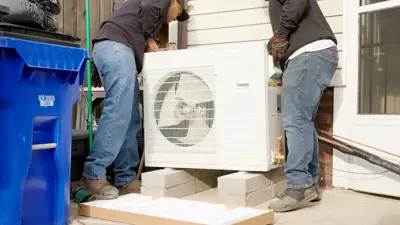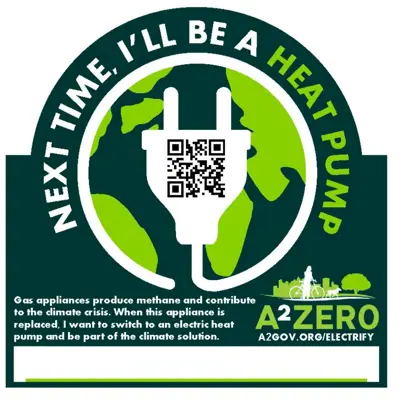Fossil gas furnaces burn gas to create heat in the home. During this process, it produces harmful emissions of nitrous oxides (NOx), carbon monoxide (CO), and particulate matter (PM), among others. These emissions can contribute to poor indoor air quality and health impacts (including asthma, allergies and learning deficits), as well as climate change. By switching to a heat pump, it eliminates gas combustion in the home, which in turn reduces harmful emissions and improves the air quality inside the home.
What is a Heat Pump?
A heat pump is a device that heats or cools a space by transferring thermal energy from a cooler area to a warmer one, using the refrigeration cycle. Like your refrigerator and traditional air conditioner, heat pumps use electricity to transfer heat from a cool space to a warm space, making the cool space cooler and the warm space warmer. During the heating season, heat pumps move heat from the cool outdoors into your warm house. During the cooling season, heat pumps move heat from your house into the outdoors. Because they transfer heat rather than generate heat, heat pumps can efficiently provide comfortable temperatures for your home (even when it’s very cold).
Why Should I Consider Switching to a Heat Pump?
Types of Heat Pumps
How Do I Find a Heat Pump Contractor and Get Estimates?
Consult the A2ZERO Heat Pump Concierge. This platform enables users to input some information about their home and obtain instant estimates for various heat pump system designs. The estimates include up-front costs and any weatherization or upgrades that would be needed, impact on monthly bills, and all rebates and incentives applicable to the project. For those interested in moving forward, an on-site home assessment is conducted with a Pearl Energy Advisor to confirm the project specifications and lock in pricing, followed by direct oversight of installation.
Can a Heat Pump Handle Ann Arbor's Cold Climate?
Despite clear efficiency and low-carbon benefits, heat pumps from 20 and 30 years ago struggled to operate in sub-freezing temperatures. Proven technical advances have drastically improved heat pump performance in cold climates; cold climate heat pump models maintain efficiency down to 5 deg F, and some are even able to perform below -10 deg F. These heat pumps have been successfully field tested in climates like Minnesota and the Arctic Circle. Improved integration with backup electric resistance systems provide an extra layer of security.
The heat pumps of today are capable of far more than those from previous decades. In response to concerns about cold climate performance, cold-climate specific standards are being rapidly developed to provide real-world performance information on cold climates. Both the Northeast Energy Efficiency Partnership and the Canadian Standards Association are working on these standards.
Additionally, ground source heat pumps use the temperature of the ground to transfer heat, which maintains a stable temperature regardless of the outdoor air temperature. Therefore, even as it gets extremely cold or hot, they maintain a similar level of efficiency.
Water Heaters and Clothes Dryers
Heat Pump Hot Water Heaters and Clothes Dryers are a very viable option when replacing an old gas appliance. They work in a similar fashion to ASHPs, pulling heat out of the ambient air to warm the water or air. There are a number of manufacturers making heat pump water heaters now, including some with lifetime warranties.
What is a Home Energy Assessment, and do I Need One?
What About Financing Options?
Michigan Saves is the State's non-profit "Green Bank," helping residents obtain low-interest loans for energy efficiency upgrades. The also have a contractor network, and look for the "Electrification Badge" to help residents find contractors skilled in heat pumps and weatherization.
More Information
- A playlist on heat pump videos curated by the GreenHome Institute
- Heat pumps and how to use them
- Heat pumps and their use in cooling buildings
- Heat pumps in cold climates
- Heating homes and water with cleaner electricity
- How heat pumps work and their many benefits
- Impacts of using fossil fuel-burning appliances inside our buildings
- New York State Energy Research and Development Authority heat pump planner



